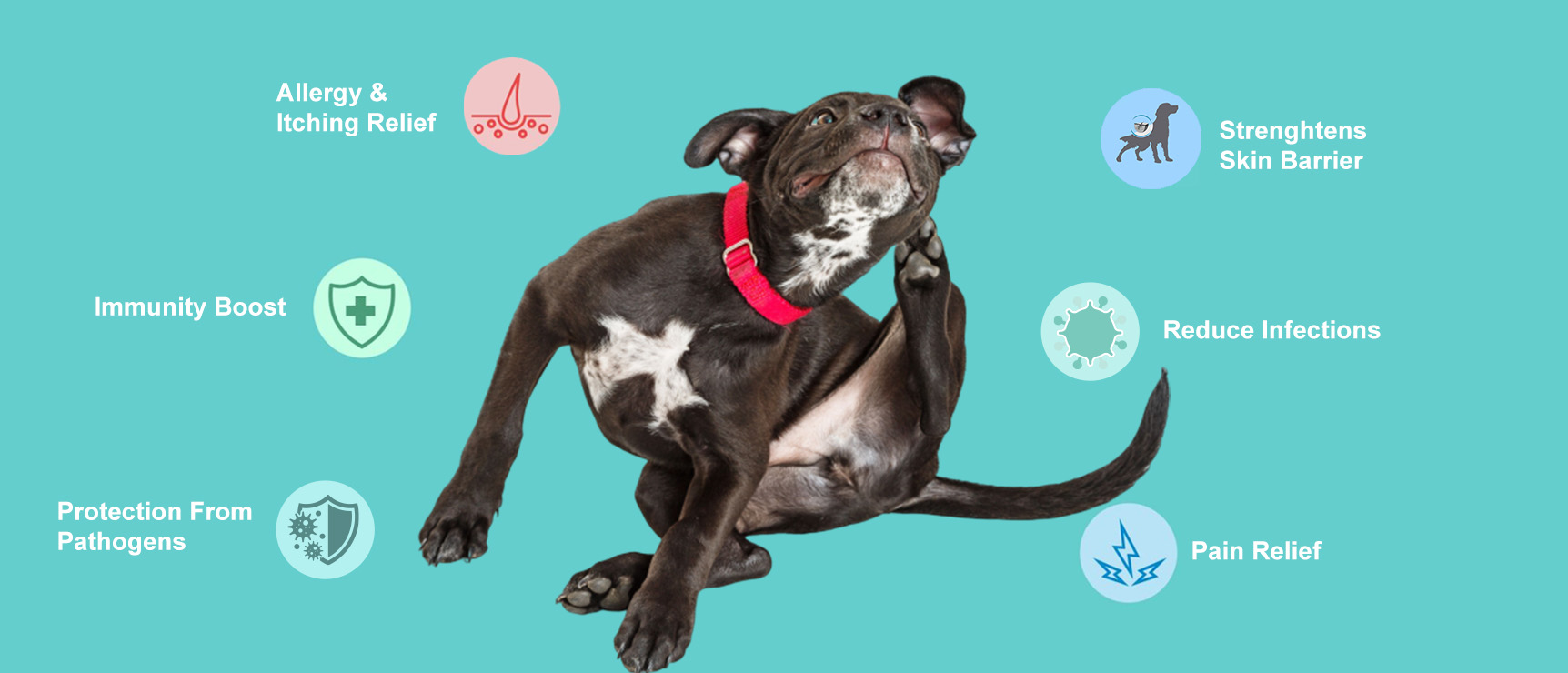Allergy & Itch
Just like humans, dogs can develop allergies to many things around them, including their food! In this post, our vets suggest the best foods for dogs with food allergies or intolerances.
23,761 Meals Donated
4,188 Blankets Donated
10,153 Toys Donated
13,088 Rescue Miles Donated
$2,358 Funded For D.V. Survivors
$7,059 Funded For Service Dogs
Just like humans, dogs can develop allergies to many things around them, including their food! In this post, our vets suggest the best foods for dogs with food allergies or intolerances.





The following highly rated dog foods meet or exceed AAFCO nutritional recommendations and are formulated under the guidance of a board-certified veterinary nutritionist. These factors ensure that your dog gets the right nutrients for their age and breed size. The list provides a variety of dietary options including prescription foods and OTC options. You should always consult your dog’s veterinarian for any restrictions specific to your pup’s age, breed or medical conditions.
iHugDogs is reader-supported. All of the links below may be paid affiliate links, where we receive a small commission on a product at no additional cost to you.
Best Overall Dry: Wellness Simple Limited Ingredient Recipe at Chewy ($16)
Best Overall Wet: Hill’s Science Diet Sensitive Stomach & Skin Canned Food at Chewy ($45)
Best for Senior Dogs: Blue Buffalo Basics Limited Ingredient Diet at Chewy ($21)
Best for Skin Allergies: Hill’s Science Diet Sensitive Stomach & Skin Dry Dog Food at Chewy ($17)
Best For Wheat Allergies: Finn Allergy & Itch ($30)
Best for Chicken Allergies: Merrick Real Salmon & Brown Rice Recipe Dry Dog Food at Chewy ($23)
Price at time of publish: $76 (26-pound bag)
Designed with dogs prone to allergies in mind, this dry dog food with a single protein source aims to deliver well-rounded nutrition while minimizing ingredients that could potentially trigger sensitivities. Engineered to be easily digestible, it contains added fiber and probiotics for digestive support.
The primary animal protein in Wellness Simple Limited Ingredient dog food comes from ducks, providing an alternative for dogs with common allergens such as beef, chicken, and lamb. Alongside duck, key ingredients include oatmeal, peas, ground rice, and potato protein. Noteworthy is the absence of meat by-products, dairy, corn, soy, eggs, and artificial preservatives.
Although the formula is free from wheat and gluten, the inclusion of oatmeal and ground rice may make it unsuitable for dogs with grain allergies. Wellness also offers tailored variations of this limited-ingredient diet, catering to small breeds and those focused on maintaining a healthy weight.
What We Like:
What We Don’t Like:
Price at time of publish: $69 (12, 2.5-ounce cans)
Many dogs have a fondness for wet food, which is available in dense paté or thick stew forms. Hill’s Science Diet offers a delectable stew variant that can be served on its own or poured over dry food for a delightful meal. Crafted with sensitive stomachs in consideration, this highly palatable recipe features turkey as the primary protein source, with some chicken ingredients included. Additionally, it is fortified with essential nutrients like vitamin E, vitamin B12, and vitamin D3.
What We Like:
What We Don’t Like:
Price at time of publish: $63 (23-pound bag)
We all aspire for our pets to enjoy a lengthy and healthy life, and a crucial aspect of achieving this is adapting their diet to suit their aging requirements. As dogs age, maintaining healthy digestion becomes increasingly vital, and this Blue Buffalo blend of turkey and potato is specifically formulated to address that need. With turkey as the primary ingredient, it provides essential protein for your senior dog, steering clear of common allergy triggers like chicken and beef. Furthermore, the recipe incorporates omega-3 and omega-6 fatty acids, contributing to overall skin and coat health.
What We Like:
What We Don’t Like:
Price at time of publish: $75 for a 30-pound bag
If your dog is experiencing increased scratching or other skin problems, veterinarians often suggest considering a change in their diet. Hill’s Science Diet, a highly reputable dog food brand, enjoys widespread endorsement from veterinarians. This specific formula features chicken as the main ingredient and doesn’t necessitate a prescription. Additionally, it includes vitamin E and omega-6 fatty acids, beneficial for promoting your dog’s skin health.
What We Like:
What We Don’t Like:
Price at time of publish: $30
Provide your beloved companion relief from bothersome allergy symptoms with Finn Colostrum Omegas & Bee Propolis Allergy & Itch Dog Supplement, a daily soft chew that your furry friend will eagerly perceive as a delightful treat. This supplement, crafted in the USA, is specifically designed to bolster your pup’s immune system and promote skin health, delivering respite from seasonal allergies.
Its composition includes ingredients like colostrum, Wild Alaskan Salmon oil, quercetin, bee propolis, and bromelain, all aimed at maintaining normal histamine levels. Additionally, the inclusion of prebiotics and probiotics contributes to supporting your pup’s healthy digestive system. It’s a convenient way to ensure your canine companion experiences the best of tail-wagging well-being!
What We Like:
What We Don’t Like:
Price at time of publish: $70 (22-pound bag)
Numerous dog food brands may include chicken by-products in their formulations, even if the front label doesn’t explicitly mention chicken. This can pose a challenge for dogs highly sensitive to chicken, as these by-products might trigger allergic reactions. Merrick’s limited-ingredient diet stands out as a suitable choice for dogs with an aversion to poultry. Crafted with nine primary ingredients such as salmon, brown rice, oatmeal, and sweet potatoes, this dry dog food ensures the absence of chicken or chicken by-products. Furthermore, it is devoid of soy, corn, wheat, and eggs.
What We Like:
What We Don’t Like:
Price at time of publish: $53 (31.1-pound bag)
Purina One +Plus Digestive Health Formula Dry Dog Food offers gentle and affordable nutrition tailored for sensitive stomachs. Featuring real chicken as the primary ingredient, this formula combines dry, crunchy kibble with flavorful meaty morsels that many dogs find enticing. Probiotics are included in each serving to promote digestive balance, accompanied by essential vitamins and minerals crucial for overall canine health.
Additionally, within the Purina One product line, there’s a specialized formula addressing skin allergies: Purina One +Plus Skin & Coat Formula Dry Dog Food. Crafted with real salmon as the leading ingredient, this variant also maintains an accessible price point.
What We Like:
What We Don’t Like:
If your dog is facing food allergies, the probable culprit is the protein source. That’s why we suggest opting for a limited-ingredient recipe, such as Wellness Simple Limited Ingredient Lamb & Oatmeal Dog Food, which we consider the top choice for dry dog food overall. Another excellent option is a salmon-based recipe like Merrick Limited Ingredient Diet with Healthy Grains, ensuring a mealtime free from irritation.
Alternatively, if your dog leans towards wet food, we recommend Hill’s Science Diet Adult Sensitive Stomach Canned Food.
An essential approach to treating intolerances and allergies involves a dietary change and nutritional adjustments. You can leverage the concept of the energetics of foods, originating from traditional Chinese medicine (TCM). This concept is also utilized in traditional European medicine and Hildegard medicine, focusing on specific properties of food to promote healing.
Allergies manifest as an overreaction to specific dog food or environmental stimuli, leading to an overheating of the organism. Some associated allergy symptoms include itchy skin, digestive problems, anal gland issues, or restlessness and stress.
According to TCM, allergies or intolerances indicate an underlying imbalance in the body, explained through the principles of “Yin and Yang,” forming the basis of all TCM theories. Both Yin and Yang exist simultaneously in the body, where Yin represents cooling, fluids, rest, and passive behavior, while Yang symbolizes heat, inflammation, and restlessness. In a healthy dog, both forces are in balance, and any imbalance signifies illness. Allergies generally involve an excess of Yang (heat).
Imagine your sensitive dog’s body as a pot of boiling water. To stop the boiling, you can either reduce the heat or add more water to the pot. In this case, TCM prescribes cooling herbs to lower the heat (Yang) in the body, along with Yin-tonifying ingredients to stimulate fluids and restore your dog’s organism to a balanced state. TCM therapists treat the root cause of allergies while simultaneously alleviating the associated symptoms.
If you suspect your dog has an allergy or food intolerance, start by filtering out ingredients that trigger these reactions. Transition your dog to a easily digestible bland diet with only two ingredients. Avoid dry food or other additions like supplements. For example, you can use horse meat with pumpkin as food.
Note: Allergic reactions may occur within hours or several days. If your dog shows no symptoms after approximately a week on the bland diet mentioned above, you can introduce a new ingredient. For allergies, consider using cooked or dried liver. Observe closely to ensure your dog remains stable. If yes, gradually add more ingredients until the diet is well-balanced.
However, if your dog exhibits signs of a reaction such as itching, rash, diarrhea, vomiting, stomach noises, bloating, anal gland inflammation, heartburn, or others, the food is likely intolerable for the dog and should be permanently removed from its diet.
A dietary therapy, combined with other medical approaches, can be an effective way to successfully treat diseases in your dog. Within traditional Chinese medicine, foods are categorized based on properties like cooling or warming.
Dogs with allergy problems and/or sensitive skin typically benefit from cooling meat types such as duck, rabbit, or horse meat. This is believed to help resolve the underlying imbalance causing visible and invisible (internal) reactions. Foods with chicken and lamb should be avoided, as both are warming meat types. Warm varieties are also unsuitable for very excitable or “hot” dogs.
In addition to cooling and warming properties, foods are associated with five tastes: sour, bitter, sweet, spicy, and salty. These are related to specific organ functions in the body and can play a crucial role in food selection. For allergy symptoms, supporting the liver is crucial. The taste associated with this organ is “sour,” which includes foods like duck, bitter leafy greens, dandelion, artichokes, and broccoli.
In addition to cooling and warming properties, foods are associated with five tastes: sour, bitter, sweet, spicy, and salty. These are related to specific organ functions in the body and can play a crucial role in food selection. For allergy symptoms, supporting the liver is crucial. The taste associated with this organ is “sour,” which includes foods like duck, bitter leafy greens, dandelion, artichokes, and broccoli.
Cold and cooling dog food:
Neutral dog food:
Neutral foods generally harmonize Yin and Yang. They can be fed in combination with other ingredients for variety. Neutral varieties are also suitable for warming very cold foods and cooling very hot foods.
Warm and hot dog food:
Note: The preparation method (heating or freezing) can intensify, balance, or mitigate the basic effects of a food. For instance, cooked food is energetically warmer than raw food (BARF) due to heating. Steaming or cooking in water adds moisturizing qualities (Yin) to your dog’s food, while methods like roasting, baking, and drying are considered drying.
To digest raw ingredients well, your dog’s body must provide a lot of energy. Therefore, a BARF diet has a strong cooling effect. Raw food might not be the best choice for chronically ill or older dogs. In such cases, offering lightly cooked food is advisable.
For a healthy dog, feeding good dog food that includes a variety of energy states and flavors is generally sufficient. However, the majority of the diet should consist of foods that strengthen the center (Earth element) and nourish the spleen, pancreas, and stomach organs. Lean beef with fennel-pumpkin vegetables and a bit of pear not only makes a tasty meal but also provides energetically balanced nutrition for your dog. You can top it off with some butter, ghee, or organic honey. If your dog is allergic to certain ingredients, do not use them.
It becomes more challenging when (chronic) illnesses are already present. In such cases, the composition of the diet should be precisely tailored to your dog and also to the underlying disease. In these situations, nutritional counseling for your dog can be highly beneficial.
Above all, it’s crucial not only to treat your dog’s symptoms but to find a holistic approach that resolves the prevailing imbalance.
Is it beneficial to opt for grain-free diets for dogs dealing with skin allergies?
When exploring suitable dog foods for skin allergies, experts suggest trying a shift in the protein source before fully embracing grain-free options. This is because current research indicates a potential connection between certain ingredients found in higher concentrations in grain-free dog foods and the risk of developing nutritional dilated cardiomyopathy, a heart disease.
“I don’t currently recommend feeding dogs grain-free food due to the increased risk of nutritional dilated cardiomyopathy,” notes Burch. “If you’re considering a grain-free diet to address skin allergies in your dog, it’s advisable to consult with your veterinarian before making the switch.”
Can I conduct food allergy tests for my dog at home?
While there are home test kits for allergies, their effectiveness in determining your dog’s allergies may be limited. Burch advises against using blood, hair, or saliva tests for food allergies, citing a potential high rate of false positives and negatives. The recommended approach for testing your dog’s allergies involves an at-home food trial conducted under veterinary guidance. This allows for monitoring the ingredients in your dog’s diet and observing their reactions.
John Smith has hands-on experience looking after two anxious and selective-eating beagles. Upon observing that his canine companion began chewing on his front paws post-meal, he experimented with various proteins and identified that his furry friend had an allergy to chicken.
In composing this article, he selected products based on what he provides for his own dogs with sensitive stomachs, drawing from his firsthand encounters with the products, customer feedback, product compositions, and advice from veterinary professionals.